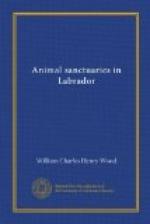4. Sport.—Sport should have a great future in Labrador. Inland game birds, except ptarmigan, are the only kind of which there is never likely to be a great abundance, owing to the natural scarcity of their food. But, besides the big game on land and game birds on the coast, there are some unusual forms of sport appealing to adventurous natures. Harpooning the little white whale by hand in a North Shore canoe, or shooting the largest and gamest of all the seals—the great “hood”—also out of a canoe, requires enough skill and courage to make success its own reward. The extension and enforcement of proper game laws would benefit sport directly, while indirectly benefitting all the other interests.
5. Zoophilists.—The zoophilist class seems only in place as an afterthought. But I am convinced that it will soon become of at least equal importance with any other. All the people, from zoologists to tourists, who are drawn to such places by the attraction of seeing animal life in its own surroundings, already form an immense class in every community. And it is a rapidly increasing class. Could we do posterity any greater injury than by destroying the ten Englands of glorious wild life in Labrador, just at the very time when our own and other publics are beginning to appreciate the value of the appeal which such haunts of Nature make to all the highest faculties of civilized man?
The way can be made clear by scientific study. The laws can be drawn up by any intelligent legislators, and enforced quite as efficiently as other laws have been by the Mounted Police in the North West. The expense will be small, the benefits great and widely felt. The only real hitch is the uninformed and therefore apathetic state of public opinion. If people only knew that Labrador contained a hundred Saguenays, wild zoos, Thousand Islands, fiords, palisades, sea mountains, canons, great lakes and waterfalls, if they only knew that they could get the enjoyment of it for a song, and make it an heirloom for no more trouble than letting it live, they might do all that is needed to-morrow. But they don’t know. And the three Governments cannot do much without the support of public opinion. At present they do practically nothing. The Ungavan Labrador has neither organization nor laws. The Newfoundland Labrador has organization but no laws. And the Quebec Labrador has laws but no observance of them.
However, Quebec has laws, which are something, legislators who have made the laws, and leaders who have introduced them. The trouble is that the public generally has no sense of responsibility in the matter of enforcement. It still has a hazy idea that Nature has an overflowing sanctuary of her own, somewhere or other, which will fill up the gaps automatically. The result is that poaching is commonly regarded as a venial offence, poachers taken red-handed are rarely punished, and willing ears are always lent to the cry that rich




